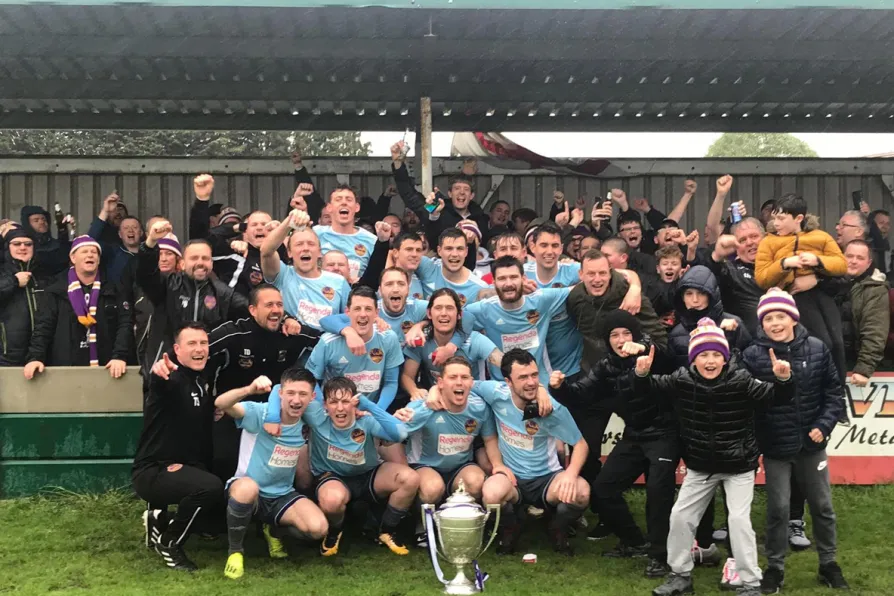

CAN a socialist football club thrive in football’s capitalist bubble?
Non-league side City of Liverpool FC are out to prove that it’s possible.
The club was founded in 2015 and registered as a community benefit society and thus exists to benefit the community in which it resides.
Their community programme organises events in support of mental health issues, equality, inclusion, and refugees, using the club and football as a vehicle.
More than a club, it can accurately be said. City of Liverpool are certainly doing things differently, but how far can they go?
At the end of their first season just two years ago, The Purps — a nickname which derives from their purple club colours, a handy mixture of blue and red — were promoted from the North West Counties Football League First Division via the playoffs.
That year they also won both league cup trophies, completing a memorable treble, and in just their second season in the North West Counties Premier League they are pushing for promotion again.
They go into this weekend’s final game level on points with Bootle FC — the side with whom they share a home ground.
Last week the two met in front of 1,374 spectators in what could turn out to be a title decider, with Bootle emerging 1-0 victors and going top of the league on goal difference.
This weekend City of Liverpool travel to Irlam while Bootle host Northwich Victoria as the race for promotion goes down to the final game.
Regardless of the outcome in the short term, long term City of Liverpool are aiming high.
But can a club run by its fans, with socialist ideals, work its way through the leagues without compromising those ideals in what can be the most capitalist of sports?
Peter Furmedge is deputy chairman of City of Liverpool FC, and he gives us the impression that it’s not only possible for such a club to reach the Football League, but almost inevitable.
“Football is highly politicised at the higher levels,” says Furmedge.
“The model of financialisation, extraction of wealth, and monetisation of social capital for private profit is entirely a product of the neoliberal hegemony of the past three decades.
“As community wealth building and common ownership edge slowly, but ever more surely, into the mainstream, there is absolutely no reason why a club based upon the political principles that underpin these economic models cannot thrive.”
There are a number of clubs throughout the world who could be described as left-leaning, not least in Liverpool. This can originate from the circumstances which surround the founding of a club, from influential figures in a club’s past, or from the area in which it resides.
Some still hold onto their socialist ideals, but these are usually kept alive by fans and their culture, rather than the owners.
There are few, if any, modern day clubs like City of Liverpool. The values of socialism run through the organisation from the ownership to the fans, and given that the club is owned by the supporters, these are one and the same.
“The club is left leaning from its core,” states Furmedge.
“The founders were motivated by socialist principles of common democratic ownership, eschewing the capitalist model of football club ownership.
“It was natural that, in a city that has been home to prominent football based activism, a club founded on such principles would attract a core of like-minded support from inception.”
On the pitch the club aims to attract the best lower league footballers from the Liverpool area, and playing in front of crowds such as the gathering which witnessed the game against Bootle is part of the attraction. The attendance last weekend was more than double any other in the league.
The club’s ethos draws like-minded supporters which in turn can attract the players, and the club progresses as a result.
City of Liverpool’s progress has already begun and, rather than being an obstacle in football’s capitalist world, its left-wing principles are providing a springboard for success.


JAMES NALTON writes how at the heart of the big apple, the beautiful game exists as something more community-oriented, which could benefit hugely under mayoral candidate Zohran Mamdani

JAMES NALTON discusses how Fifa claims to be apolitical, but as Infantino and Juventus players stood behind Trump discussing war, gender, and global politics, the line between sport and statecraft vanished

The competition sounds good on paper, and has potential to be great, but Fifa has gone out of its way to mess it up, JAMES NALTON explains














